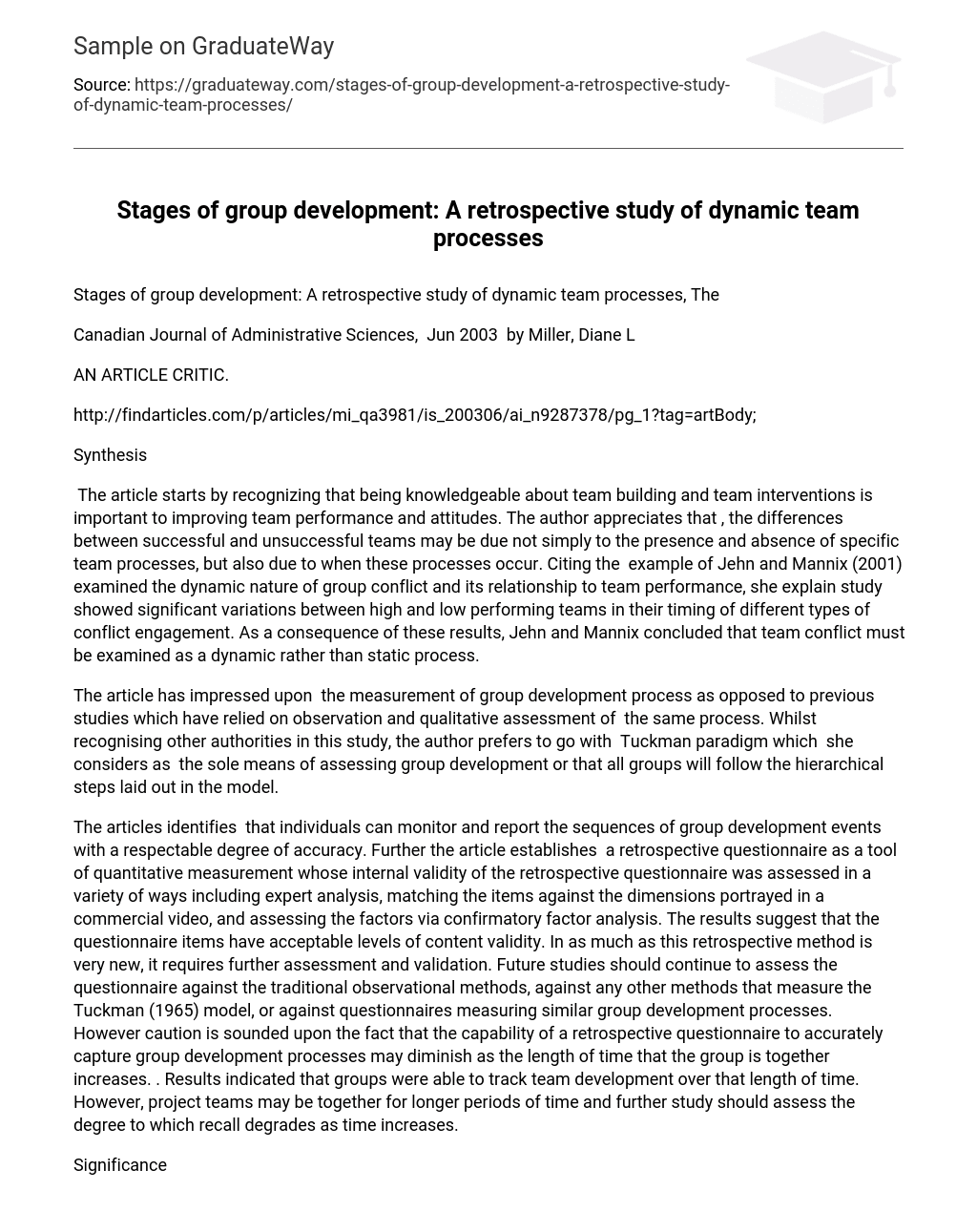Stages of group development: A retrospective study of dynamic team processes, The
Canadian Journal of Administrative Sciences, Jun 2003 by Miller, Diane L
AN ARTICLE CRITIC.
http://findarticles.com/p/articles/mi_qa3981/is_200306/ai_n9287378/pg_1?tag=artBody;
Synthesis
The article starts by recognizing that being knowledgeable about team building and team interventions is important to improving team performance and attitudes. The author appreciates that , the differences between successful and unsuccessful teams may be due not simply to the presence and absence of specific team processes, but also due to when these processes occur. Citing the example of Jehn and Mannix (2001) examined the dynamic nature of group conflict and its relationship to team performance, she explain study showed significant variations between high and low performing teams in their timing of different types of conflict engagement. As a consequence of these results, Jehn and Mannix concluded that team conflict must be examined as a dynamic rather than static process.
The article has impressed upon the measurement of group development process as opposed to previous studies which have relied on observation and qualitative assessment of the same process. Whilst recognising other authorities in this study, the author prefers to go with Tuckman paradigm which she considers as the sole means of assessing group development or that all groups will follow the hierarchical steps laid out in the model.
The articles identifies that individuals can monitor and report the sequences of group development events with a respectable degree of accuracy. Further the article establishes a retrospective questionnaire as a tool of quantitative measurement whose internal validity of the retrospective questionnaire was assessed in a variety of ways including expert analysis, matching the items against the dimensions portrayed in a commercial video, and assessing the factors via confirmatory factor analysis. The results suggest that the questionnaire items have acceptable levels of content validity. In as much as this retrospective method is very new, it requires further assessment and validation. Future studies should continue to assess the questionnaire against the traditional observational methods, against any other methods that measure the Tuckman (1965) model, or against questionnaires measuring similar group development processes. However caution is sounded upon the fact that the capability of a retrospective questionnaire to accurately capture group development processes may diminish as the length of time that the group is together increases. . Results indicated that groups were able to track team development over that length of time. However, project teams may be together for longer periods of time and further study should assess the degree to which recall degrades as time increases.
Significance
This article is significant in the sense that it shows that individual resolve is very significant in actualizing group development. By quantitatively identifying group development process tied to the individual, the author reinforces Druckers’ (1999) argument of the proactive individual who is able to recollect and produce a feedback process and therefore contributing immensely to the group success.
The article has also identified a yard stick for measuring the effectiveness of groups in recognition that groups and or teams play a very significant role in the management of organizations today. The studied tools arising can be used by managers, strategist and scholars alike to gather information on the effectiveness of groups triangulated by individual experiences.
Ways on which the article has enhanced my knowledge, clarified matters, or enlightened me
Before I read the article, I was of the opinion that individual action may not be very necessary in group success since group expectations, capacity and goals override those of the individual. In the same vein, groups may be seen as detrimental or insubordinating personal capacities to act and think independently which is not limited to behaviour. However this article has clarified that individuals involved in the group development process still have their faculties resolute to perform according to their capacities given that they can accurately account for interactions occurring within the group. It means individuals are likely to take personal responsibility even though they act as a group.
Important question raised by the authors
Since the author reaffirms the importance of individual qualities in a said group, then considerably, the invariable question should be; apart from synergy, what other motivations does a manager accrue from having tasks accomplished by a group rather than the individual?
Reference
Drucker, Peter F. (1999) “Managing Oneself,” Harvard Business Review, March–April, pp. 65–74.http://findarticles.com/p/articles/mi_qa3981/is_200306/ai_n9287378/pg_1?tag=artBody;
Ivancevich, J. and Matteson M. (2008) Organizational Behavior and Management.8th Edition, McGrawHill.
Jehn, K.A. & Mannix, E.A. (2001). The dynamic nature of conflict: A longitudinal study of intragroup conflict and group performance. Academy of Management Journal, 44, 238-251.
Tuckman, B.W. (1965). Development sequence in small groups. Psychological Bulletin, 63, 384-399.





